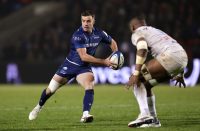 Gary Gold is cagey when he considers the question of the quality he has found at Bath in terms of squad, infrastructure and culture. Understandably so. Last season the proud west country club finished eighth in the Premiership, failing to qualify for the Heineken Cup, with memories of the halcyon days of six English League titles and 10 Cup victories from 1984 to 1996 becoming ever dimmer.
Gary Gold is cagey when he considers the question of the quality he has found at Bath in terms of squad, infrastructure and culture. Understandably so. Last season the proud west country club finished eighth in the Premiership, failing to qualify for the Heineken Cup, with memories of the halcyon days of six English League titles and 10 Cup victories from 1984 to 1996 becoming ever dimmer.
The upshot was that Bruce Craig, the pharmaceuticals multi-millionaire who owns the club, eased Sir Ian McGeechan out of the back door last spring after barely a season in charge while ushering Gold, a Springbok assistant coach during the Peter de Villiers regime, and sometime coach of London Irish and Newcastle, through the front.
Craig is a man in a hurry, as his open letter to Bath fans at the end of last season voicing his concerns over the club’s “disappointing and inconsistent” form made clear. He is also not short of rugby opinions as a former St Brendan’s (Bristol) captain and England U19 trialist, and Gold doesn’t have to be a soothsayer to know that another slip below mid-table simply won’t be good enough.
So, he’s treading carefully: “In terms of the squad, it’s above-average and could be very competitive. For instance, in the second row we are particularly good, but we could have more strength-in-depth in certain positions. The infrastructure here is outstanding, and we are in a rugby town where the club enjoys great support.”
However, Gold is blunt when he talks about Bath’s underachievement. “A lot has to be done on the culture at Bath. There is a sense that there was a hangover of success from the amateur era when the club was blessed with great rugby players, and we need to look to redefine our culture and sort out where we want to go.”

Ask Gold whether he believes that Bath, who won the Heineken Cup in 1998, will be one of England’s and Europe’s great clubs again in the near future,and his response is that he is optimistic but will not make any predictions when it comes to timelines. “I don’t want to get into that – I’m not arrogant enough to make suppositions of that sort – but, yes, Bath can get back there. However, it will take an incredible amount of work to get there, and that hard work starts now.”
Gold’s responses are peppered with references to work ethic, and it is clear that there will be no room for corner-cutters, dilettantes, prima donnas, or party animals at Bath during the South African’s tenure in charge. It is hard to imagine the cocaine scandals that saw Matt Stevens, Justin Harrison, Alex Crockett, Andrew Higgins and Michael Lipman ejected from the club in 2009 happening on Gold’s watch.
“In terms of the cocaine thing, I wasn’t in the country, and I wasn’t aware of the brutality of the whole episode. The one factor which successful rugby organisations have in common is that they work incredibly hard – and I mean incredibly hard – and part of that is that they do it for each other. I want every Bath supporter to walk out after paying their hard-earned money to watch this team saying that the players put their bodies on the line and gave absolutely 100 per cent. If they do that then we should win more than we lose, and, if we lose to a better side on the day but know we’ve given everything, then I think our supporters will back us.”
Does he see any vestiges of the lack of rigour, self-belief and ambition that has led Bath to underperform for so long within his current squad, or are they hungry fighters?
“If I sense it then we are not setting about our task well enough, because that’s what this coaching group takes responsibility for. I cannot apologise that the city is beautiful or that the facilities are great, or that we have an owner in Bruce Craig who has put his money where his mouth is. Players at Chelsea and Manchester United don’t apologise for their facilities – all we have to do is work bloody hard, and that means harder than our competitors. It’s a cop-out to use a beautiful city and its laissez-faire atmosphere as an excuse. Cape Town, where I come from, is also a beautiful city ringed by mountains and sea, but you can’t say, ‘I’m so overawed by the beauty of the town that it stops me doing my job’. I’d be annoyed if the good life in Bath was affecting players doing their job.”
Gold also hits back at the suggestion that there are too many coaches at Bath, where he has been joined by former London Irish duo, Toby Booth and Neal Hatley, former England defence coach Mike Ford, and Brad Davis who is retained from the old regime.
“During my time with South Africa over four years no-one complained that we had too many coaches, but the longest period we had with the Springbok squad was the 10 days before the British Lions series started in 2009. The truth is that there is not a lot of coaching in international rugby, instead it’s more about organisation and environment. By comparison at Bath we’ve got 40 players who will need developing and encouraging over 40 weeks, and that’s an incredible amount of work. If you are running a competitive team in the Premiership, one of the toughest competitions in the world, and also creating an Academy, then it’s not possible with just two or three coaches.”
He explains how the new Bath command module works: “As director of rugby I oversee the club culture, the game plan, selection, recruitment, player development and the overall organisation. There is overlap with all the other coaches in those areas, but they are my responsibility. The coaching structure is Toby Booth is responsible for attack, Neal Hatley for set-piece and breakdown, Mike Ford for defence, and Brad Davis for counter-attack and kicking. The coaches are putting in 10 hour days, and there is more than enough work.”

One of the most frustrating aspects at Bath, and one of the surest signs of a backsliding side, is when talented players do not take the next step. Suggest to Gold that he has players in that bracket in Dave Attwood, Ollie Barkley, Matt Banahan, Nathan Catt, Dan Hipkiss, Kyle Eastmond, and Stephen Donald, who did not have the best start in the Premiership after kicking New Zealand to 2011 World Cup glory, and he counters that it is a clean slate and he can only go on what he has seen for himself.
“I agree they are outstanding players, and I have been impressed with all of them in this pre-season. They have ticked the box that they are good rugby players, but what has happened in the past is out of my hands and I can’t pass judgement on past regimes.”
Yet, he adds: “I’d like to see those guys step up to the plate. The skill and challenge for us is getting them to do that, and by their own admission they feel they and Bath have underperformed.”
He says that he has been impressed by Carl Fearns, and will employ the Saxons back rower at either blindside or No.8, while he also comments that Lee Mears and Rob Webber at hooker, and the Welsh second row newcomer, Dominic Day, have been prominent in pre-season.
However, without tub-thumping, Gold makes it clear that it’s his way or the highway. “If a player of ability is not responding then the system we have created will spit them out. If we do our job well enough, and create a hard enough working culture, then they will stick out because they don’t buy into it, and they will leave.”

Gold says that his impressive rescue attempt on Newcastle in last season’s relegation battle provided him with one of the biggest lessons of his coaching career. “It proved to me that if the desire is there you can create something even if you don’t have many world-class players. There were some great characters at Newcastle, and guys like Jimmy Gopperth, Peter Stringer – an unbelievable pro – James Hudson, Tim Swinson, Jamie Helleur, Will Welch and Mark Wilson said, ‘You give us a plan and we will do it for you’ – and those away wins at Gloucester and Wasps, and the draw against Harlequins showed their desire. It invigorated me as a coach and showed that the power of the collective unit is unbelievable.”
Ultimately, Newcastle were relegated, but Gold predicts a swift return to the Premiership under Dean Richards. “They have a good squad and I reckon they will bounce back and will benefit from the breathing space and the confidence that a few big wins in the Championship bring.”
Returning to the vexed question of why Bath have failed to live up to their triumphant turn-of-the-century legacy, Gold reveals that he is enlisting help from some of the club’s former greats to provide some answers.
“We are asking David Trick to put a day together, hopefully including the likes of Stuart Barnes, John Hall, Mike Catt, Jeremy Guscott, Richard Hill and Phil de Glanville, to ask that self-same question.
“I have my views, but I am not informed in the way they are, because they still live here and the club remains close to their hearts.”
He adds: “I want their feedback, but I think that there was a mindset when Bath were successful which was perhaps more by default than design, because the club had a very good group of players – and they attracted other good players.
“Then, in the transition from amateur to pro, it became that if you wanted to play at a nice rugby club then you came to Bath.
“That doesn’t work in the modern pro game because everyone is competing for the best players and you have to be cutting edge in terms of facilities, conditioning and coaching.
“Living in a beautiful city’s not enough because players want to go where clubs are winning trophies.”
He also has a stab at an explanation: “Maybe the transition was not handled well, and Bath became just another rugby club. I’m keen to know the real answer, but for now all I’m saying is let’s be highly competitive for the fans who are so passionately behind the club.”
Bath have gone for Gold. Now all he has to attend to is the little matter of finding a formula capable of putting the club back on the podium after 15 years among the also-rans.






















